Niger Delta
World Bank Extends NG-CARES Programme In Nigeria

The World Bank has approved the extension of the Federal Government COVID-19 Action Recovery and Economic Stimulus tagged: “NG-CARES” Programme from June 2023 to June 2024.
The Minister of State for Budget and National Planning, Clem Agba, made this known, Wednesday, at a Ministerial Town Hall meeting on NG-CARES programme for four states in Benin.
Agba, who chairs the Federal CARES Steering Committee (FCSC), said extension of the programme was to address the food security gaps caused by the 2022 flood.
He said: “Due to last year’s flood that affected food security and the supply chain, we approached the World Bank for extension of the programme from June 2023 to June 2024.
“I am glad that the World Bank’s Task Team Leader has communicated to me that we now have approval for extension and the official letter would be sent to me next week”.
Agba said Federal Government had also secured approval for another set of advance disbursement to the states, following extension of the programme.
He said based on the first round of direct assessment by the Independent Verification Agency, NG-CARES had impacted over two million direct beneficiaries, including the poor and vulnerable Nigerians.
Agba further said the NG-CARES programme was one of the policy options explored by the Federal Government to achieve its objective of removing 100 million Nigerians from poverty.
He restated the government’s commitment to restoring the livelihood of the poor and vulnerable Nigerians, maintain food security and facilitate the recovery of micro and small businesses.
The minister added that the Town Hall meeting enabled the government to talk directly to the beneficiaries in order to know their challenges with a view to correcting them for future programmes, among others.
Also, Dr AbdulKarim Obaje, the National Coordinator, NG-CARES, said World Bank had approved the programme in 2020, while disbursement begun in October 2021.
Obaje said states in Benin Centre, namely: Edo, Bayelsa, Delta and Rivers earned N1.459 billion with 19,188 beneficiaries; N2.28 billion with 27,735 beneficiaries; N3.31 billion with 31, 058 beneficiaries and N2.42 billion with 9, 877 beneficiaries respectively.
The Tide’s source reports that the Town Hall meeting was attended by stakeholders and beneficiaries of NG-CARES Programme from Bayelsa, Delta, Rivers and Edo States.
Niger Delta
Stakeholders In Delta Seek Stronger GBV Action, Women’s Leadership

Niger Delta
C’River Suspends Taskforce Activities Over Drivers’ Protest

Niger Delta
A’Ibom Assembly Urges More Private Investments In Agriculture

-

 News4 days ago
News4 days agoAmend Constitution To Accommodate State Police, Tinubu Tells Senators
-

 Politics4 days ago
Politics4 days agoSenate Urges Tinubu To Sack CAC Boss
-
Business4 days ago
Crisis Response: EU-project Delivers New Vet. Clinic To Katsina Govt.
-
Business4 days ago
President Tinubu Approves Extension Ban On Raw Shea Nut Export
-

 News4 days ago
News4 days agoDisu Takes Over As New IGP …Declares Total War On Corruption, Impunity
-
Business4 days ago
Fidelity Bank To Empower Women With Sustainable Entrepreneurship Skills, HAP2.0
-
Business4 days ago
President Tinubu Extends Raw Shea Nuts Export Ban To 2027
-
Sports4 days ago
NDG: Rivers Coach Appeal To NDDC In Talent Discovery

